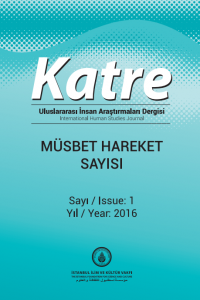Etik Bir İdeal Olarak Tanrı-İnsan ve İnsan-ı Kamil: Said Nursi’ye Referansla Nübüvvet ve Felsefe Geleneği Üzerinden Bir Bakış
Abstract
Bu çalışmada, Said Nursi’nin ‘ene’ konusundaki mülahazalarından hareketle, teşebbüh-ü bi’l-vacip (teomorfizm) düşüncesi etrafında, nübüvvet geleneği karşısında konumlandırdığı felsefi geleneğe yönelttiği eleştiri değerlendirilmekte ve bu çerçevede antik Yunan toplumundaki Tanrı-insan ilişkisi ve bunun Platon ve Aristo’nun etik felsefelerine yansıma biçimleri ele alınmaktadır. Her iki düşünür de insan-Tanrı arasında geçişliliği kabul ettiği için, insani ve toplumsal kemalin nihai hedefi olarak Tanrı-insan olmayı önermektedir. Nebevi gelenek ise insanı, varlık düzleminin “imkân” katına koyarken, Tanrı’yı “vacip” olan alanda görür. Bu da ikisi arasında zorunlu bir geçişsizliği beraberinde getirir. İnsanî kemal için “en iyi örnek” peygamberlerin ortaya koyduğu “sünnet”tir. İnsanın dikey bir sıçrayışla vücub alanına katılmak istemesi, yani teşebbüh-ü bi’l-vacip fikri, enenin nominal varlığını terk ederek gerçeklik kazanma teşebbüsüdür. Said Nursi, bu yüzden, bir hakikat dili olarak felsefenin yüceltilmesini eleştirirken, felsefe geleneğinin nübüvvet geleneğine tabi olmasının zorunluluğuna atıfta bulunur.
References
- 4
Conception of God-man vs the Exemplary Man as an Ethical Ideal: The Tradition of the Prophethood vs the Tradition of the Philosophy with special reference to Said Nursi
Abstract
In this article, by drawing upon Said Nursi’s conceptualization of human self (ene), his criticism of the philosophical tradition is treated in the context of the idea of teomorphism. The idea of teomorphism in the ancient Greek community is discussed with reference to the fathers of the Greek philosophy, Platon and Aristotle. Both thinkers accept teomorphism as an ethical ideal for human self and society. On the contrary, the tradition of the Prophethood rejects transitivity between the “possible” realm of existence and the necessary one. This tradition posits the sunnah of the prophets as the best example for the human perfection. Accordingly, the idea of teomorphism, and as an its extension, antrophomorphism, is a reflection of attesting “real” instead of “nominal” existence to the human self (ene). Hence, Said Nursi alludes to the necessity of the philosophical tradition be subordinate to the tradition of the prophethood.
References
- 4
Details
| Primary Language | Turkish |
|---|---|
| Journal Section | Refereed Articles |
| Authors | |
| Publication Date | March 1, 2016 |
| Submission Date | April 1, 2016 |
| Published in Issue | Year 2016 Issue: 1 |

Katre International Human Studies Journal is open access journal under the CC BY-NC license (Creative Commons Attribution 4.0 International License)
Based on a work at https://dergipark.org.tr/en/pub/katre
E-mail: katre@iikv.org

